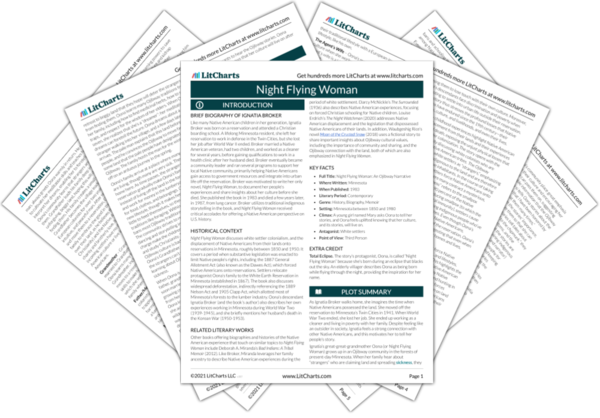Mother/Wa-wi-e-cu-mig-go-gwe Quotes in Night Flying Woman
These strangers […] are again asking the Ojibway to mark a paper. […] The Ojibway to the east have made the mark, and now they are on the big water where they must stay forever. The strangers promised never to enter their forests but they came anyway[.]

Unlock explanations and citation info for this and every other Night Flying Woman quote.
Plus so much more...
Get LitCharts A+Poor Trees, we are leaving, but you will be gone too after the strangers come. […] Poor squirrels, where will you go after the strangers come?
The women wove reed mats and cut birch bark. They fastened the mats around the base of the lodge frames and put overlapping birch-bark sheets on the upper part. Then the lodges were ready.
Our lives must now revolve around this lodge, because we must not meet the strangers. But remember that we, the Ojibway, have always moved freely from a summer place to a winter place, with a blueberry place, a ricing place, and a sugar bush in between.
The people […] welcomed the stranger who had traveled with him. They prepared a feast and made a place of rest for them.
He said that they must mark a paper before a man called Agent, and afterward they would be given food and clothing.
I do not like cutting the trees […] I think too often of the animal people. They will be few, and they will be gone from this land. When we have enough of the lumber, I shall no longer cut the trees or travel the rivers on them. My heart cries too often when I do this.
Each ricing time the man will come for the children. If they live in the longhouse of the school they will never know our ways. Our strength will be lost. If we move close to the big village, the children will stay home at night and we can still teach them the old ways. We must decide—shall we stay separate and not see the children from ricing to planting, or shall we speak to them each night about the good of our people?
Maybe it will start them learning civilized ways.
But always there was the sorrow that the sickness brought, and life was shortened by it. Many times the sickness took mothers and fathers. The children who were left behind were raised as little brothers and sisters by those for whom they were namesakes.

Mother/Wa-wi-e-cu-mig-go-gwe Quotes in Night Flying Woman
These strangers […] are again asking the Ojibway to mark a paper. […] The Ojibway to the east have made the mark, and now they are on the big water where they must stay forever. The strangers promised never to enter their forests but they came anyway[.]

Unlock explanations and citation info for this and every other Night Flying Woman quote.
Plus so much more...
Get LitCharts A+Poor Trees, we are leaving, but you will be gone too after the strangers come. […] Poor squirrels, where will you go after the strangers come?
The women wove reed mats and cut birch bark. They fastened the mats around the base of the lodge frames and put overlapping birch-bark sheets on the upper part. Then the lodges were ready.
Our lives must now revolve around this lodge, because we must not meet the strangers. But remember that we, the Ojibway, have always moved freely from a summer place to a winter place, with a blueberry place, a ricing place, and a sugar bush in between.
The people […] welcomed the stranger who had traveled with him. They prepared a feast and made a place of rest for them.
He said that they must mark a paper before a man called Agent, and afterward they would be given food and clothing.
I do not like cutting the trees […] I think too often of the animal people. They will be few, and they will be gone from this land. When we have enough of the lumber, I shall no longer cut the trees or travel the rivers on them. My heart cries too often when I do this.
Each ricing time the man will come for the children. If they live in the longhouse of the school they will never know our ways. Our strength will be lost. If we move close to the big village, the children will stay home at night and we can still teach them the old ways. We must decide—shall we stay separate and not see the children from ricing to planting, or shall we speak to them each night about the good of our people?
Maybe it will start them learning civilized ways.
But always there was the sorrow that the sickness brought, and life was shortened by it. Many times the sickness took mothers and fathers. The children who were left behind were raised as little brothers and sisters by those for whom they were namesakes.











